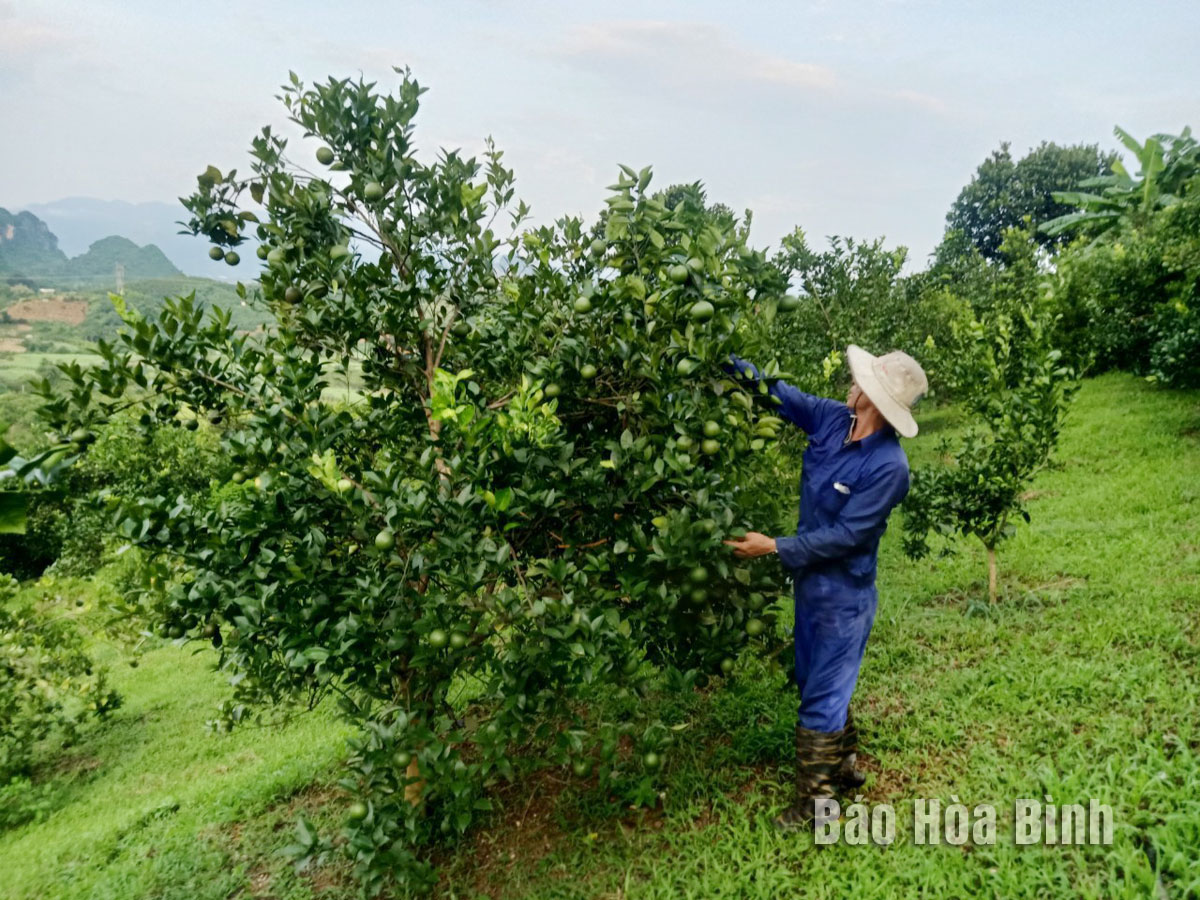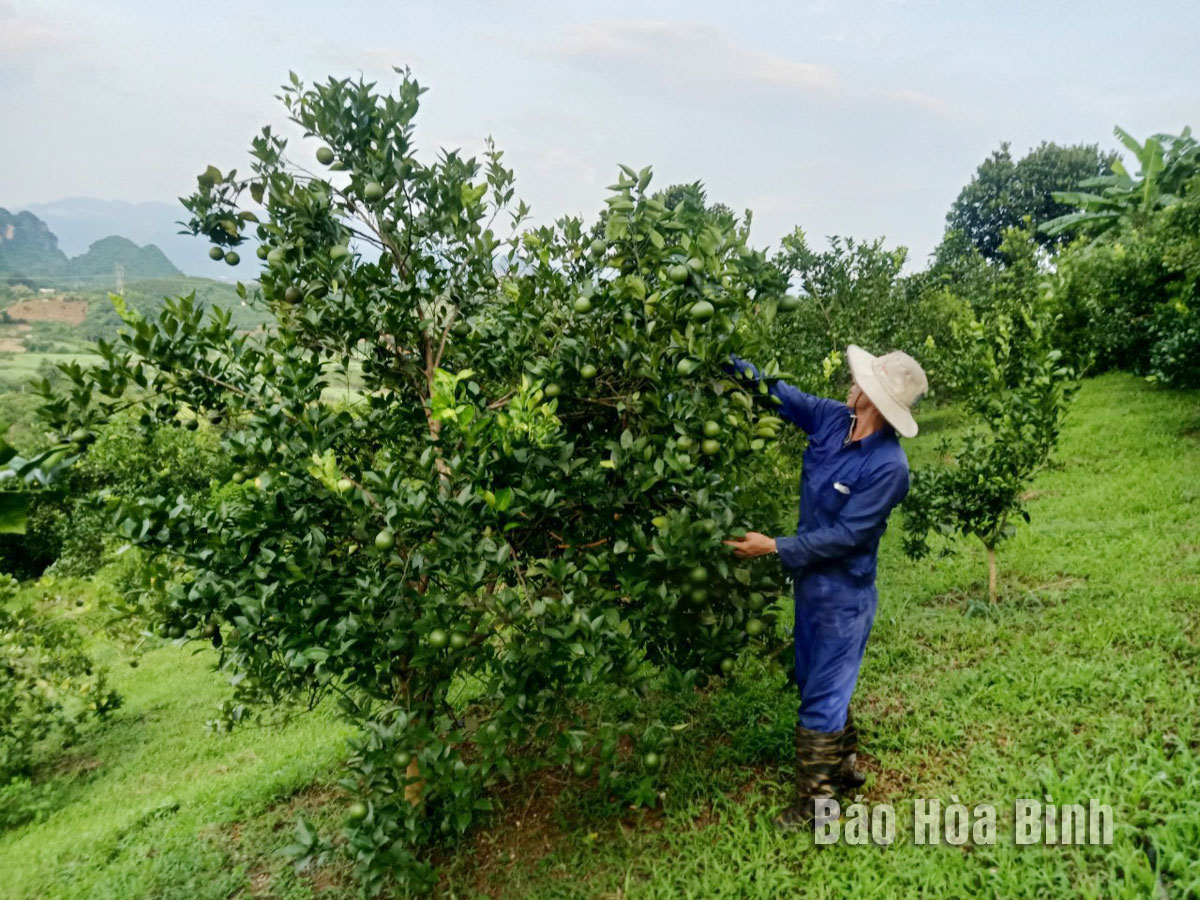
(HBO) – Cao Phong district in the northern mountainous province of Hoa Binh has promoted high quality, sustainable agricultural development, contributing to creating jobs and increasing income for locals.
Photo: Cao Phong district has over 314 hectares of orange
cultivated according to VietGAP standards.
With the goal of developing agriculture as a foundation towards safety,
efficiency, large commodity production which is associated with consumer
markets, closely linked with processing industry, tourism, and ecological
environment protection and adapt to climate change, the district has reviewed
cultivation methods to ensure consistency and feasibility to effectively
exploit the locality's potential and competitive advantages; and effectively
implement projects on f agriculture, forestry, fisheries, irrigation
development. Many have proved their effectiveness, promoting production
development such as reviewing and adjusting the planning of forests.
The district has promoted the application of organic and smart
agriculture, digital transformation, biotechnology and mechanisation in
agricultural production.
It has also implemented the One Commune -Open Product (OCOP)
programme in association with ecotourism development. So far, the district has
built many clean agricultural production models according to VietGAP and
organic standards, not only bringing about high economic efficiency but also
contributing to protecting the living environment.
Economic organisation models in agriculture and rural areas have
gradually been innovated and developed in accordance with the market mechanism,
making an important contribution to the effective implementation of input and
output services for production, promoting the development of commodity
production. The district has 49 cooperatives and 10 cooperative groups.
Bui Van Hung, deputy head of the Agriculture and Rural
Development Department of Cao Phong district, said that the district's
agriculture sector has focused on building a clean and safe agricultural
production area, applying high technology for export.
To date, the district has 314.85ha of orange cultivated
according to VietGAP standards, with 10 OCOP products having been recognised by
the provincial People's Committee, of which there are 3 products rated 4 stars,
and 7 products rated 3 stars
In the coming time, the district will focus on management of
planning and production development orientation. It will also focus on
effective and sustainable production, develop large-scale, concentrated
agricultural production areas.
The
district will organise production chains for key products of the district,
replant citrus fruit trees, and improve the quality of citrus fruit trees
according to VietGAP and LocalGAP standards for export.
According to data from the Hoa Binh Provincial Party Committee, the industrial production index for the first six months of 2025 is estimated to have increased by 20% compared to the same period last year. This marks the highest year-on-year growth rate for this period since 2020.
In the first six months of 2025, Hoa Binh province’s export turnover was estimated at 1.145 billion USD, marking an 18.11% increase compared to the same period in 2024. Import turnover was estimated at $ 804 million, a 17.15% increase, which helped the province maintain a positive trade balance.
The lives of the ethnic minority farmers in Tan Lac district have gradually improved thanks to the new directions in agricultural production. This is a testament to the collective strength fostered through the professional associations and groups implemented by various levels of the district’s Farmers’ Union.
With the motto the "product quality comes first,” after nearly one year of establishment and operation, Muong village’s Clean Food Agricultural and Commercial Cooperative, located in Cau Hamlet, Hung Son Commune (Kim Boi district), has launched reputable, high-quality agricultural products to the market that are well-received by consumers. The products such as Muong village’s pork sausage, salt-cured chicken, and salt-cured pork hocks have gradually carved out a place in the market and they are on the path to obtaining the OCOP certification.
In the past, the phrase "bumper harvest, rock-bottom prices" was a familiar refrain for Vietnamese farmers engaged in fragmented, small-scale agriculture. But today, a new spirit is emerging across rural areas of Hoa Binh province - one of collaboration, organisation, and collective economic models that provide a stable foundation for production.
Maintaining growing area codes and packing facility codes in accordance with regulations is a mandatory requirement for agricultural products to be eligible for export. Recently, the Department of Agriculture and Environment of Hoa Binh province has intensified technical supervision of designated farming areas and packing facilities to safeguard the "green passport" that enables its products to access international markets.



